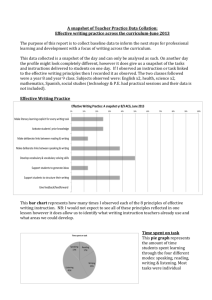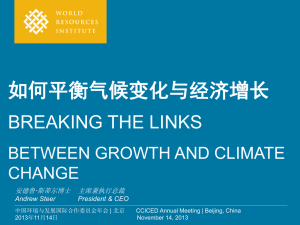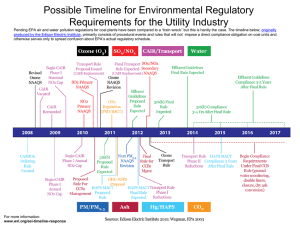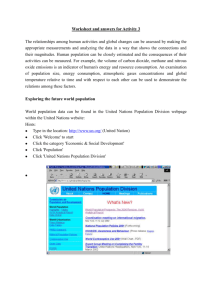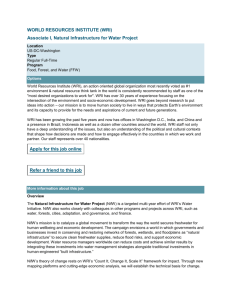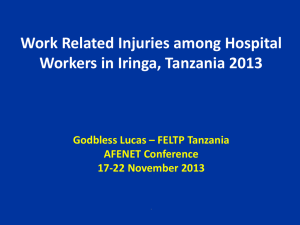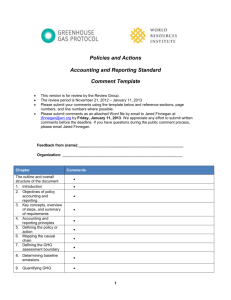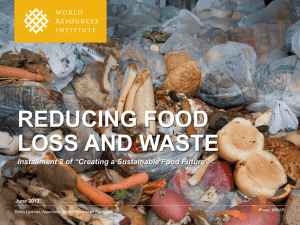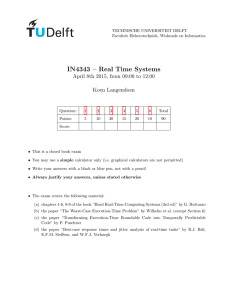March 12, 2013 - World Resources Institute
advertisement
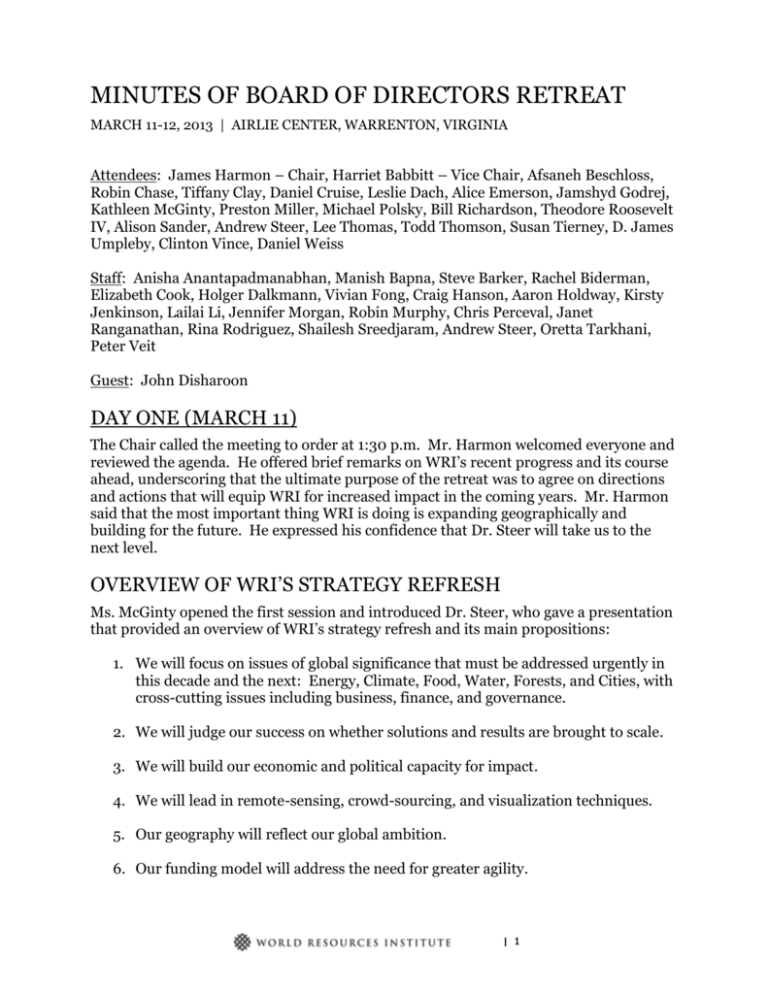
MINUTES OF BOARD OF DIRECTORS RETREAT MARCH 11-12, 2013 | AIRLIE CENTER, WARRENTON, VIRGINIA Attendees: James Harmon – Chair, Harriet Babbitt – Vice Chair, Afsaneh Beschloss, Robin Chase, Tiffany Clay, Daniel Cruise, Leslie Dach, Alice Emerson, Jamshyd Godrej, Kathleen McGinty, Preston Miller, Michael Polsky, Bill Richardson, Theodore Roosevelt IV, Alison Sander, Andrew Steer, Lee Thomas, Todd Thomson, Susan Tierney, D. James Umpleby, Clinton Vince, Daniel Weiss Staff: Anisha Anantapadmanabhan, Manish Bapna, Steve Barker, Rachel Biderman, Elizabeth Cook, Holger Dalkmann, Vivian Fong, Craig Hanson, Aaron Holdway, Kirsty Jenkinson, Lailai Li, Jennifer Morgan, Robin Murphy, Chris Perceval, Janet Ranganathan, Rina Rodriguez, Shailesh Sreedjaram, Andrew Steer, Oretta Tarkhani, Peter Veit Guest: John Disharoon DAY ONE (MARCH 11) The Chair called the meeting to order at 1:30 p.m. Mr. Harmon welcomed everyone and reviewed the agenda. He offered brief remarks on WRI’s recent progress and its course ahead, underscoring that the ultimate purpose of the retreat was to agree on directions and actions that will equip WRI for increased impact in the coming years. Mr. Harmon said that the most important thing WRI is doing is expanding geographically and building for the future. He expressed his confidence that Dr. Steer will take us to the next level. OVERVIEW OF WRI’S STRATEGY REFRESH Ms. McGinty opened the first session and introduced Dr. Steer, who gave a presentation that provided an overview of WRI’s strategy refresh and its main propositions: 1. We will focus on issues of global significance that must be addressed urgently in this decade and the next: Energy, Climate, Food, Water, Forests, and Cities, with cross-cutting issues including business, finance, and governance. 2. We will judge our success on whether solutions and results are brought to scale. 3. We will build our economic and political capacity for impact. 4. We will lead in remote-sensing, crowd-sourcing, and visualization techniques. 5. Our geography will reflect our global ambition. 6. Our funding model will address the need for greater agility. | 1 7. Our Board will play a bigger, more consequential and international role in our success. Dr. Steer said the Management Team would produce by the Fall Board meeting a fully worked up program detailing plans on the above areas. Ms. McGinty invited Governor Richardson and Dr. Tierney to offer their comments on the foregoing propositions. Governor Richardson said he believed the propositions offered a terrific vision. Dr. Tierney said she believed the six focus areas chosen are the right onesDirectors requested further clarity on the process for deciding what we say “no” to and how we will operationalize a complex matrix to avoid siloing and achieve synergies across programs and countries. Mr. Thomson underlined that the integration across issues is the key and that WRI can play an important cross-cutting role that others do not. Dr. Steer said that these points would be given attention in the workedup strategy. As an example of a product line, Mr. Bapna gave a brief presentation on Global Forest Watch (GFW), which will be launched shortly. He said GFW will gather, analyze, and share timely, high-resolution data on forest cover, enhanced through crowd-sourced onthe-ground inputs. Mr. Thomas said GFW is an excellent example of focusing on an urgent issue and taking it to scale. SCALE, TECHNOLOGY, AND USING OUR TOP TALENT: BREAK-OUT SESSIONS AND REPORT BACK The Board welcomed its newest member, Jim Umpleby of Caterpillar, to the meeting. Mr. Umpleby introduced himself and described his background and interests. Mr. Harmon acknowledged the important role Caterpillar has played in WRI’s work, particularly on sustainable cities. Mr. Cruise opened the session by introducing a short video statement from Ms. Beinecke. On the Board, she suggested WRI create opportunities for Directors to get to know staff in the areas they are interested in. On impact, she said scale was about putting enough weight behind a limited number of issues so that WRI would get both results and attention. She pointed to one of WRI’s signature achievements, the Greenhouse Gas Protocol, which has had a large impact through scale. When you achieve scale, she said, you own that space. Scaling and Escalating Our Impact Ms. Clay presented WRI’s propositions on scaling: WRI will only pursue projects with potential to have impact at scale. Projects need to articulate a clear strategy for scaling, including selecting their “escalator.” Scaling should be made part of the culture and DNA of WRI through staff training. | 2 Ms. Clay, serving as rapporteur, said that Directors agreed on the importance of scaling and discussed the need for top-down accountability on stage gates and milestones to ensure projects actually move to scale. Directors also discussed how to ensure the right mechanism to deal with the tension between innovation and the focus on scale. Information into Action Ms. Chase presented WRI’s propositions: Build institutional capacity and skills by making strategic hires in information communication (including Geographic Information Systems [GIS]), visualization, and interactive technologies. Harvest low-hanging fruit such as creating a common GIS data template and web portal, training staff on interactive communication technologies, and establishing a cross-program committee to advance open data. Leverage opportunities for using remote sensing across WRI. Recruit a Board member from the information technology sector. Mr. Thomson, the rapporteur, said that Directors agreed on the proposed course of action and the five-year vision of becoming the go-to place for accessible, decisionrelevant information and analysis on select global resources and becoming a leader in interactive, open-data platforms. Directors discussed the opportunities and threats presented by a more transparent, data-filled world and how WRI should respond – e.g., in the realm of crowdsourcing. Maximizing the Value of Our Board Dr. Tierney presented WRI’s propositions: Define a structured role with each Board member every two years to spur engagement and action. Create advisory committees that tap into Board members’ specific areas of expertise. Adopt a fundraising policy with the WRI Board and country office boards that includes giving and assisting with fundraising. By 2017, 50 percent of WRI’s Board members are from outside the U.S. Mr. Polsky, the rapporteur, said there was broad agreement on the first three propositions, but the Directors proposed to have a small group of Board members discuss the target for internationalizing the Board. Mr. Polsky said advisory committees provide the most direct way to engage Directors and create a situation where both Directors and WRI benefit. CASE STUDY ON BOARD ENGAGEMENT Mr. Thomas provided an update on his work with WRI’s Climate and Energy Program in engaging with prominent politicians on climate impacts and adaptation. He explained how he worked with scientists in Florida to create a presentation on local climate impacts and used this to brief prominent local political leaders who could help to bring broader attention to the issue. He asked fellow Directors for assistance in approaching | 3 other politicians and having similar conversations with them. Mr. Harmon said this work provided an excellent example of Board engagement. GLOBAL DRIVERS OF CHANGE Ms. Sander gave an engaging presentation on global drivers of change entitled “Riding the Right Waves for Maximal Impact.” Building on her work, which involves tracking more than 100 exponential global trends, her main message was that linear approaches are insufficient in a world of exponential change, underlining the need for WRI to focus on scale. She summarized the results of her staff and Board survey and provided sample quotations from respondents which highlighted concerns about the scale of global challenges WRI aims to address and the need for bold thinking to achieve greater impact. Ms. Sander focused on three emerging trends: resource scarcity, tech trends 2.0, and “environment in a box.” In closing, Ms. Sander asked how, in a world of scaling problems, we scale the solutions. She said that in an exponential world it is important to choose areas of work carefully, looking for alignment with powerful solutions; to build capabilities and theories of change for each area of work that scale as powerfully; to select the metrics by which to measure success; to frame the problem for maximal leverage and connection; and to build in periodic refresh to acknowledge pace of change in context. DINNER SPEECHES Mr. Dach, Mr. Roosevelt, and Mr. Thomson each gave a speech at dinner in which they reflected on their ten years at WRI and outlined their thoughts on the organization’s future. On behalf of the entire Board, Mr. Harmon thanked the departing Directors for their long and meritorious service. Mr. Roosevelt, it was announced, will remain involved with WRI as co-chair of the new Global Advisory Council. DAY TWO (MARCH 12) REFLECTIONS ON THE FIRST DAY OF THE RETREAT Mr. Miller provided an excellent summary of the first day of the retreat and Mr. Polsky offered his reflections. Mr. Polsky said the proposed strategies are excellent and that the most important thing now is to execute them with vision and focus. In addition, Mr. Polsky said he was struck by the quality of WRI’s people, both staff and Directors. He said we need to think about how to fully utilize this tremendous human resource. OUR GEOGRAPHY: CURRENT STATUS AND FUTURE PLANS Mr. Godrej opened the session by noting the importance of WRI’s decision to set up offices in China, India and Brazil. He summarized WRI India’s recent progress, where there are now close to 40 staff and projects moving to scale. Mr. Harmon thanked Mr. Godrej for his vision, leadership, and generosity. | 4 Mr. Bapna acknowledged the important role the Board has played in helping WRI to move from being a Washington-based organization to a global organization, which he said has been WRI’s most defining institutional change. Mr. Bapna presented WRI’s propositions on global presences: Fully establish WRI institutional presences in China, India, and Brazil and fully develop the Sisterhood model. Establish light-touch institutional presences in Africa, Indonesia, and Europe. Invest in communications technology to ensure that our global network operates seamlessly as one unit. Ensure country strategies both address local priorities and lever WRI assets. Ms. Li, WRI’s new China Country Director, provided an update on WRI China, which now has 20 staff at its Beijing office. She described the political context in which WRI works and emphasized the focus of China’s new leadership on urbanization and building an “ecological civilization.” Ms. Biderman provided an update on WRI Brasil, which will soon have a legal presence. She said Brazil is a strong democracy but one with big challenges. She said Rio+20 has kept sustainability on the political agenda, and the World Cup and Olympics provide great opportunities for sustainable transport. EMBARQ, which has operated for eight years in Brazil, has been a great success, she said; it is well-known and well-respected. She said WRI has a strong network of partners to draw upon in Brazil. Mr. Godrej said WRI India is making great progress and is about to hire a country director. He thanked Mr. Umpleby and Caterpillar for the support given in addressing urbanization challenges in Bangalore. He also thanked members of the India Advisory Group for visiting WRI India in January and invited Ms. Clay to reflect on her experience as part of this group. Ms. Clay said that if the past 5-10 years has made WRI the top think tank, the opportunity now is to define what it means to be a global think tank. Mr. Murphy presented WRI’s plans for setting up “light touch” offices in Africa, Indonesia, and Europe. Such offices, he explained, would allow WRI to be closer to partners and to access local funding through on-the-ground presences. BRIEF PRESENTATION ON TECHNOLOGY Ms. Chase gave a brief presentation on her ideas on scaling. To address global issues like climate change, she said, we need good ideas to be implemented quickly, affordably, efficiently, and at scale, everywhere. Observing the rapid scaling achieved by technology companies like Google, she said, we need to decide what we do best and focus on platforms that are simple to use and which deliver rapid growth and economies of scale. We can work with partners which can help to deliver diversity and innovation and thus, together, we can unlock value. NARRATIVE, COMMUNICATIONS, AND TEAMWORK ACROSS GEOGRAPHIES: BREAK-OUT SESSIONS AND REPORT BACK Designing and Communicating Our Narrative | 5 Ms. Babbitt, the session chair, introduced videos on WRI’s narrative from Ms. Beinecke, Mr. Doctoroff, and Mr. Persson. Mr. Persson emphasized the importance of knowing what you want to do and what it is possible to achieve. Ms. Beinecke said what makes WRI unique is the “World” in its name; WRI must make clear what this means. Mr. Dach, the rapporteur, said WRI must emphasize things that people will remember: the big things, and the how. He said WRI needs proof points and needs to root everything it does in deep analytics, or “big data.” Working Effectively Across Geographies Ms. Babbitt, the rapporteur, said Directors discussed the concern that, as WRI grows geographically, there needs to be synergies and effective coordination across the globe. The group discussed ingredients to help ensure a global model works, including finding the right balance between focusing on global initiatives and responding to local needs. Directors agreed on the importance of defining the governance lines for country offices and giving local ownership to achieve results. Think Tank / Do Tank: What Are Our Flagship Product Lines? Ms. Sander, the rapporteur, said that Directors liked the concept of flagship product lines and discussed what would constitute a flagship. Ms. Sander suggested that it could be described as a set of tools that can be customized by local partners. She said flagships will increasingly originate from local offices – e.g., the Sustainable Cities initiative in China. Flagships, she said, would help with focusing our work but that a lot of work would spill over the edges, some of which might be seeds for future flagships. Ms. Chase said that in an electronic era large-scale work can increasingly be done without any local office presence – e.g., offering online tools that any government or NGO would be able to pick up and customize. Mr. Miller provided an example of a successful flagship product line in action from Ms. Biderman, who said that Brazil, with GBP 100,000, was able to use the Greenhouse Gas Protocol to engage 100 Brazilian companies. Now Brazil is looking to scale the program up to 5000 companies using funds that the companies pay in as fees. FROM THE “FRESH THINKERS” Ms. Clay introduced three younger staff members who had prepared short “elevator pitches” on concepts they had developed for improving WRI. After their presentations, Directors expressed their strong support for hearing from younger staff at future Board meetings. BUSINESS MEETING: COMMITTEE REPORTS The minutes from the Board of Directors conference call on December 11, 2012, were approved as drafted. Mr. Harmon led the Directors through a series of election resolutions, which were approved as drafted. Of particular note, Felipe Calderón, former President of Mexico, was elected to a three-year term as a Director. In addition, the Board Class of 2016 was elected: Ms. Beinecke, Ms. Clay, Mr. Godrej, Mr. Miller, Mr. Persson, and Mr. Ross; Mr. Polsky was elected to serve an exceptional one-year | 6 term on the Board; and the Board Chair and Vice Chair, the officers of WRI, and the officers of the WRI Fund were re-elected for 2013. Mr. Roosevelt gave a brief update from the Nominating Committee. He thanked Mr. Dach and Mr. Thomson for their decade of service to WRI and said WRI would now have the formidable task of trying to replace the irreplaceable. With his own departure, he announced Afsaneh Beschloss as the new chair of the Nominating Committee. He finished by requesting input from Directors on potential nominees currently before the Committee and requesting suggestions for additional nominees. Mr. Barker drew Directors’ attention to the Finance and Investment report in the Board materials and led a brief discussion on the highlights. He reported that current revenue prospects for fiscal 2013 exceed expenses. He said that funding uncertainties might place the outlook as low as $1 million below budget but that proposed support cost rates would ensure an adequate base for full recovery. He said that raising the additional $1 million of unrestricted funding to meet the $2.25 million target for fiscal 2013 would be challenging but achievable. Mr. Barker also led the Board through resolutions on the recent auditor’s report and IRS Form 990. He also reviewed WRI’s Anti-Corruption, Bribery, and Conflict of Interest policy and circulated acknowledgement forms for Directors to sign. A NEW FUNDING MODEL FOR AN AGILE WRI Mr. Vince presented the Development Committee’s propositions on a new funding model: Raise more unrestricted funds through: o Expanding WRI’s Corporate Consultative Group (CCG); o Creating a Global Advisory Council (GAC) of high-net-worth individuals; and o Increasing Board giving to 100 percent participation, within Directors’ comfort zones Create a $3 million reserve, representing 5 percent of the $60 million budget anticipated in five years. Mr. Vince requested names of possible prospects for the CCG and GAC and requested support in approaching these prospects. NEXT STEPS Dr. Steer summarized his takeaway messages from the retreat. He said he was gratified to observe how much Directors want to be part of WRI and how, when referring to WRI, they say “we.” A related message that he heard loud and clear, he said, was that Directors want to be used more. In that spirit, he said staff would follow up with each Director to propose ways in which they could be of great help. Dr. Steer said the retreat provided him with a real sense of energy and a clear way forward and he and Mr. Harmon thanked Directors for their active and substantive participation. | 7 EXECUTIVE SESSION The meeting went into Executive Session at 3:00 p.m. The meeting adjourned at 3:15 p.m. Steve Barker Secretary and Treasurer Chief Financial Officer and Vice President of Administration | 8
